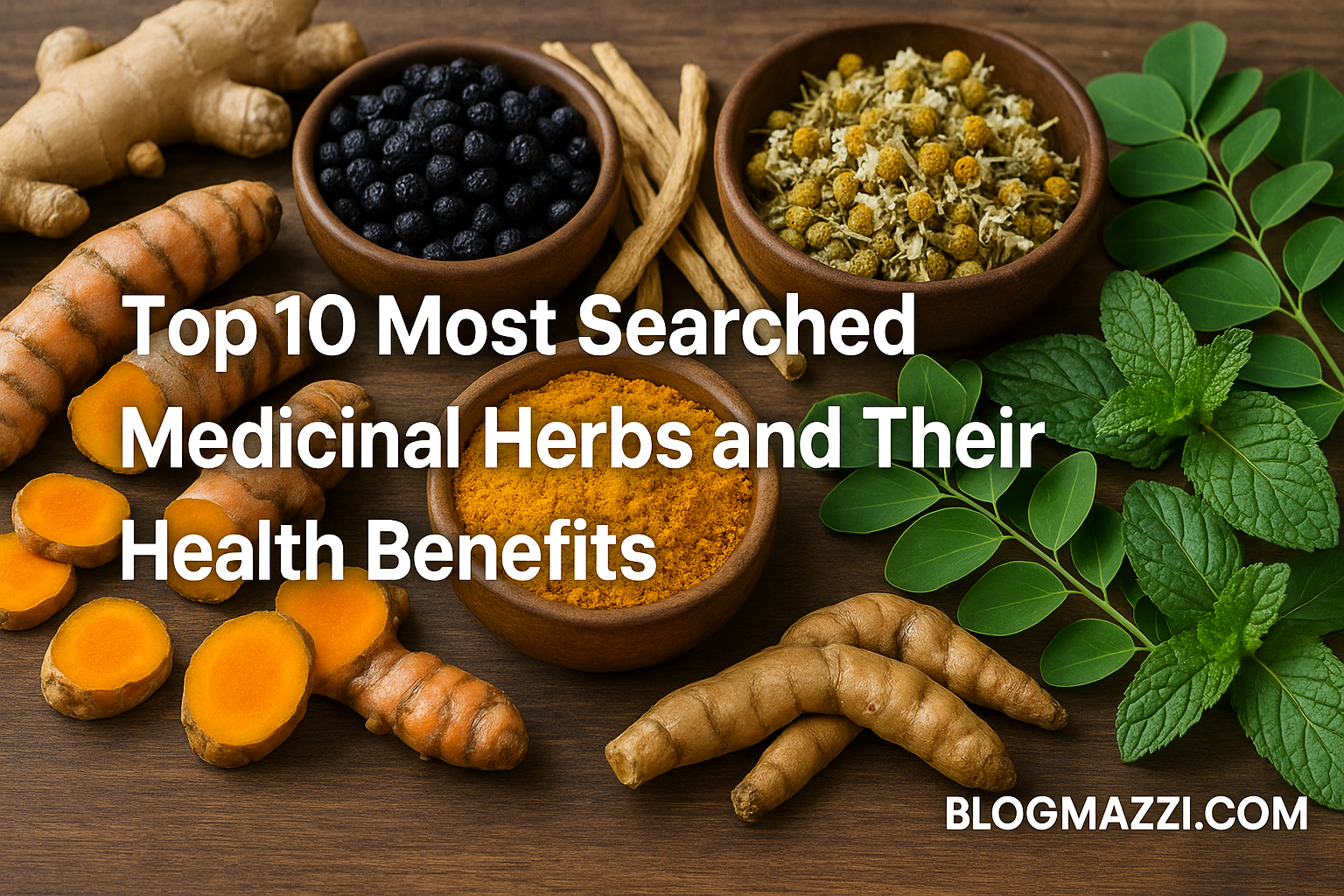Why Medicinal Herbs Are More Popular Than Ever
In an age where holistic wellness and natural remedies are rising in popularity, medicinal herbs have taken center stage. From managing stress and boosting immunity to improving digestion and mental clarity, herbal solutions are becoming an essential part of modern health routines. This article explores the top 10 most searched medicinal herbs in 2025, backed by science, tradition, and a growing global interest in plant-based healing.
Whether you’re a wellness enthusiast, a digital nomad looking for natural supplements, or simply curious about the benefits of herbs you’ve seen trending online, this guide offers a detailed breakdown of what makes these plants so powerful—and why they’re worth your attention.
1. Turmeric (Curcuma longa)
What Makes Turmeric a Super Herb?
Turmeric is arguably the most popular medicinal herb in the world right now. Its active compound, curcumin, is known for its powerful anti-inflammatory and antioxidant effects.
Health Benefits
- Reduces chronic inflammation
- Supports joint and muscle health
- Enhances brain function and mood
- Promotes healthy digestion
2. Ashwagandha (Withania somnifera)
Why Is Ashwagandha Trending?
Ashwagandha is an adaptogen, helping the body adapt to stress and regulate cortisol levels. It’s widely used in Ayurvedic medicine and now in Western wellness circles.
Health Benefits
- Reduces anxiety and stress
- Improves sleep quality
- Boosts testosterone and fertility in men
- Enhances cognitive function
3. Ginger (Zingiber officinale)
More Than a Kitchen Spice
Ginger is one of the oldest medicinal plants, revered for its digestive and anti-inflammatory properties. It’s often consumed in teas, supplements, and culinary dishes.
Health Benefits
- Relieves nausea and motion sickness
- Improves digestion and gut motility
- Reduces menstrual pain
- Has antimicrobial and antiviral properties
4. Ginseng (Panax ginseng / Panax quinquefolius)
The Ancient Energy Booster
Ginseng is used globally for its ability to boost energy, mental performance, and immunity.
Health Benefits
- Increases energy and reduces fatigue
- Supports immune system
- Improves memory and mental clarity
- May reduce blood sugar levels
5. Peppermint (Mentha piperita)
The Fresh Solution for Gut Issues
Peppermint is known for its cooling effect and is commonly used to ease digestive issues, headaches, and sinus congestion.
Health Benefits
- Soothes IBS symptoms
- Relieves tension headaches
- Acts as a natural decongestant
- Enhances alertness
6. Chamomile (Matricaria chamomilla)
Nature’s Gentle Sedative
Chamomile is a go-to herb for relaxation and sleep. Popular as a tea, it’s also used in skincare and stress-relief remedies.
Health Benefits
- Promotes restful sleep
- Reduces stress and anxiety
- Eases stomach cramps
- Has anti-inflammatory effects
7. Elderberry (Sambucus nigra)
The Immune System Warrior
Elderberries have gained immense popularity for their immune-boosting power, especially during flu season.
Health Benefits
- Fights cold and flu symptoms
- Supports respiratory health
- Rich in antioxidants and vitamins
- Reduces inflammation
8. Moringa (Moringa oleifera)
The Miracle Tree
Known as the “miracle tree,” moringa is packed with essential nutrients and is used to combat malnutrition in many parts of the world.
Health Benefits
- High in vitamins A, C, and E
- Supports detoxification
- Balances blood sugar levels
- Reduces oxidative stress
9. Milk Thistle (Silybum marianum)
Liver’s Best Friend
Milk thistle is primarily known for its ability to protect and detoxify the liver, making it a favorite in detox protocols.
Health Benefits
- Promotes liver cell regeneration
- Protects against toxins and alcohol damage
- Reduces cholesterol
- Supports skin health
10. Holy Basil (Ocimum sanctum / Tulsi)
Sacred and Powerful
Holy basil, also known as tulsi, is another adaptogen that’s revered in Ayurvedic medicine for its spiritual and health-promoting properties.
Health Benefits
- Reduces stress and promotes calm
- Balances blood sugar and hormones
- Boosts immunity
- Protects against environmental toxins
What Are the Most Searched Medicinal Herbs in 2025?
The most searched medicinal herbs in 2025 include turmeric, ashwagandha, ginger, ginseng, peppermint, chamomile, elderberry, moringa, milk thistle, and holy basil. These herbs are popular for their natural healing abilities, ranging from stress relief to immune support.
Pro Tips: Expert Advice on Using Medicinal Herbs
- Start with one herb at a time to monitor how your body reacts.
- Use standardized extracts to ensure consistent dosage.
- Consult a healthcare provider if you’re pregnant, nursing, or on medication.
- Incorporate herbs into your meals for easy and tasty health boosts.
- Choose organic and reputable brands for safety and efficacy.
- Keep a health journal to track benefits and side effects.
Frequently Asked Questions (FAQ)
What is the best herb for anxiety and stress?
Ashwagandha is widely regarded as one of the most effective herbs for managing anxiety and stress. As an adaptogen, it helps balance cortisol levels and improve your body’s response to stress.
Can I take multiple herbs at once?
Yes, but it’s best to introduce them gradually. Some herbs may interact with each other or with medications, so consult a healthcare professional before combining them.
Are herbal supplements safe?
Generally, herbs are safe when taken in appropriate doses. However, quality matters—choose products that are third-party tested and free of fillers or harmful additives.
Which herb is best for boosting immunity?
Elderberry is known for its powerful immune-boosting effects, especially against cold and flu viruses.
How long do herbal remedies take to work?
Some herbs, like peppermint or chamomile, have immediate effects. Others, like ashwagandha or turmeric, may require consistent use over weeks to see noticeable benefits.
If you’re using any of these herbs in your daily routine, share your experience in the comments below! Let’s build a community of natural wellness together.



